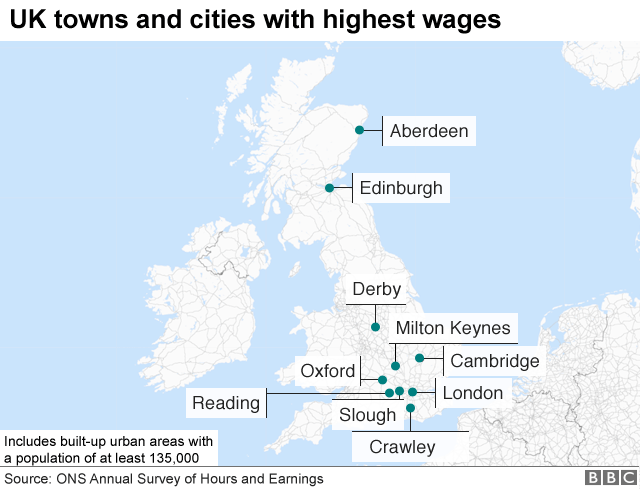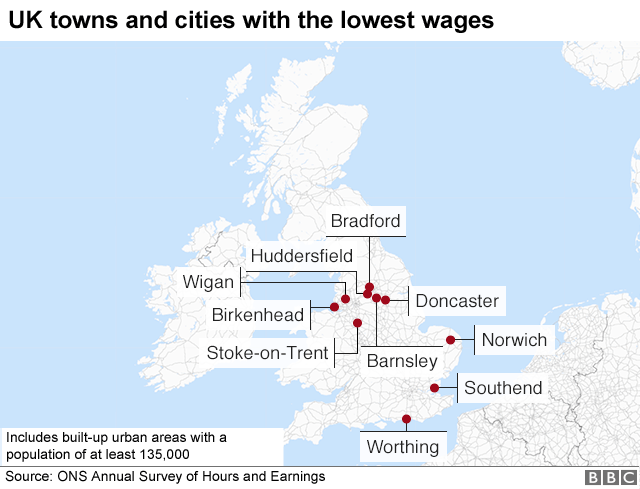The UK towns and cities with the highest and lowest wages
- Published
- comments

Whether you are a security guard, lawyer, or IT worker, wages vary hugely across the UK. But where are the towns and cities that offer the best wages?
Workers in 15 of the country's largest towns and cities - defined here as built-up urban areas with 135,000 or more people, external - earn more than the average weekly wage of £539.
In contrast, workers in the 48 other towns and cities of this size earned less than the national average. (Full list at bottom of story).
The reasons reveal a great deal about the way people live and work.
The UK's highest paid towns and cities
There are no prizes for guessing that salaries are highest in London, where the average weekly wage is £727.
Nor that the capital is followed by neighbouring towns and cities.
The next six highest earning places are all in the South East, with average wages of £600 or more in Reading, Crawley, Milton Keynes, Cambridge, Slough and Oxford.

That's largely because they are all home to significant numbers of highly skilled workers who can command good wages. It's also due to their proximity to London, which helps these places attract high-paying companies.
But it's not just the South East that is doing well, with wages of almost £600 per week in Edinburgh, Aberdeen, and Derby, thanks mainly to their successful finance, oil and manufacturing industries.
The UK's lowest paid towns and cities
At the other end of the table, the lowest pay is, perhaps surprisingly, found in another place close to London.
At £413 per week, average pay in Southend is just over half that in the capital.
This helps explain why so many people commute from Southend into London, with one in five of its working population making the journey.
The number of people earning their money in London means that the average salary among Southend residents is £144 higher than it is for those who actually work in the town.
However, Southend is one of the few places in the South East near the bottom of the pay-scale. Worthing is the only other town from the region in the bottom 10.

More broadly, there is a definite north-south divide when it comes to wages, with most - but not all - of the lowest paid towns and cities in Yorkshire and the North West of England.
Huddersfield has the second lowest wage of any large town or city, with its workers earning £424 per week on average. It is followed by Birkenhead and Wigan, where workers are paid £428 and £436 respectively.
Belfast (£514) and Cardiff (£505) also fall under the UK average for wages, despite being the capitals of Northern Ireland and Wales respectively.
Why do wages differ between cities?
The main reason why some towns and cities offer lower average wages is simple: they are home to fewer high paying occupations.
For example, more than 12% of jobs in Reading and Milton Keynes are in high-income senior management roles, which pay an average £915 per week in the UK. Only 6% of jobs in Stoke and Hull are in this category, with just over 8% in Glasgow and Swansea.

Call centre staff are paid most in Crawley and least in Wigan
Even within cities there can be great differences - workers in Tower Hamlets, in east London, are paid an average of £952 per week, compared with £518 for those working in Sutton, on the outskirts. Again, this reflects the number of senior managers in each area.
Skills levels are also a big issue in most places with below average wages.
For example, Wigan, Barnsley and Doncaster - all of which feature in the bottom 15 - have some of the lowest shares of residents educated to degree level.
Swansea and Belfast have some of the highest levels of residents who have no formal qualifications whatsoever.
Same job, different wage
There are also big gaps between what people get paid for doing the same kinds of jobs in different towns and cities.
Workers in jobs classed by the Office for National Statistics as "elementary occupations" - such as cleaners and security guards - are paid less in Plymouth and Warrington (£205 per week) than anywhere else in the country. In Slough, people in equivalent roles are paid about twice as much.
Those in "sales and customer service occupations", such as sales assistants and call centre staff, are paid least in Wigan (£207 per week) and most in Crawley (£354).
The same disparities can be seen among senior managers and directors, with the lowest salaries in Southend (£615 per week) and the highest in London (£1,208 per week).
There are a number of reasons why.


Differences in the cost of living is one, with housing in places such as London, Cambridge and Reading being much more expensive than elsewhere in the country.
To attract the workers they need, businesses have to offer higher wages, especially to people at the lower end of the salary scale - which pushes up the average wage.
A notable exception to this pattern is Derby, which despite being in the top 10 for wages (£595 a week) has relatively low house prices.
But a bigger factor is the value people working in the same jobs in different places bring to the economy.

For example, in the business services sector - which includes lawyers and architects - the average output of a worker in London, in monetary terms, is more than double that in Southend.
That's because lawyers in London are more likely to be undertaking work for which they can charge bigger fees.
Think corporate lawyers working in London's financial services, compared with local housing conveyancing solicitors in Southend.
Similarly, the value of the work done by someone in the information and communications sector (which includes computer programmers and telephone engineers) in Reading is twice that of someone working in the same sector in Wakefield.
This reflects the fact that Reading is home to many high skilled, complex roles in computing giants such as Microsoft and Hewlett Packard.
How can struggling cities boost average wages?
To improve wages in poorly paid cities, the big challenge is to make more high quality jobs - those that contribute more to the economy - available to people living in them
This is one reason why politicians and commentators have been so worried about productivity in recent years.
Only by increasing the amount the average worker produces will we be able to see sustained rises in pay.
The lack of such opportunities in struggling towns and cities has implications for how attractive they are for people to live in.

Over the past 10 years those towns and cities that have the highest paying jobs have seen the largest growth in the working age population - people aged between 16 and 64.
Places such as London, Edinburgh and Milton Keynes have been able to attract significant numbers of new residents because of the jobs and wages they offer.
But Burnley and Birkenhead have seen their working age populations fall, reflecting lower wages and the relative lack of career opportunities.
Creating more jobs in these places is only part of the answer to improving living standards.
Raising wages will be critical in turning around the fortunes of both struggling towns and cities and the people living in and around them.
Highest and lowest wages in UK's largest towns and cities*
London: £727
Reading: £655
Crawley: £633
Milton Keynes: £619
Cambridge: £609
Slough: £606
Oxford: £600
Edinburgh: £598
Aberdeen: £597
Derby: £595
Aldershot: £588
Southampton: £579
Luton: £571
Swindon: £560
Bristol: £547
National Average: £539
Leeds: £533
Coventry: £532
Birmingham: £527
Glasgow: £526
Gloucester: £526
Portsmouth: £520
Belfast: £514
Liverpool: £512
Manchester: £512
Warrington: £510
Northampton: £508
Ipswich: £506
Cardiff: £505
Dundee: £503
Bournemouth: £503
Basildon: £501
Newcastle: £501
York: £501
Blackpool: £500
Exeter: £499
Peterborough: £497
Telford: £497
Brighton: £496
Chatham: £494
Blackburn: £488
Nottingham: £486
Sunderland: £484
Wakefield: £483
Leicester: £480
Preston: £480
Middlesbrough: £477
Sheffield: £474
Newport: £473
Mansfield: £472
Plymouth: £467
Hull: £466
Swansea: £464
Burnley: £459
Stoke: £455
Bradford: £455
Worthing: £455
Barnsley: £453
Norwich: £450
Doncaster: £447
Wigan: £436
Birkenhead: £428
Huddersfield: £424
Southend: £413
*The Centre for Cities data covers built-up urban areas with a population of 135,000 or more

About this piece
This analysis piece was commissioned by the BBC from an expert working for an outside organisation.
Andrew Carter is chief executive and Paul Swinney is head of research and policy at the Centre for Cities, which describes itself as working to understand how and why economic growth and change takes place, external in the UK's cities.

Edited by Duncan Walker
- Published17 April 2018

- Published7 April 2018

- Published22 March 2018

- Published21 March 2018

- Published5 February 2018

- Published19 September 2017
